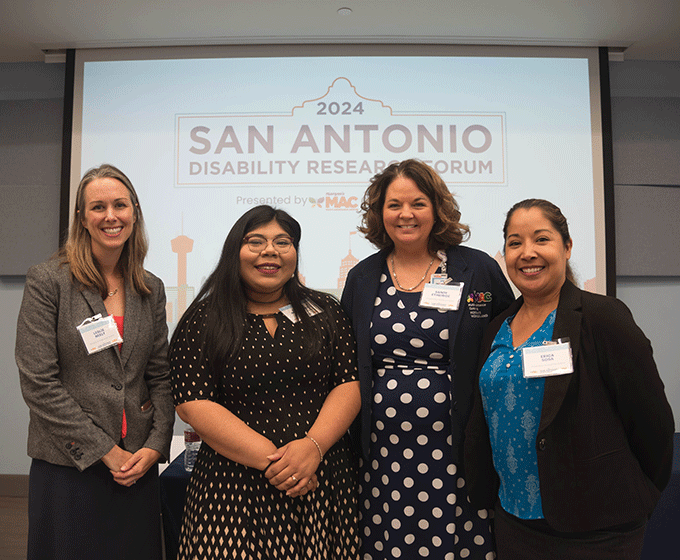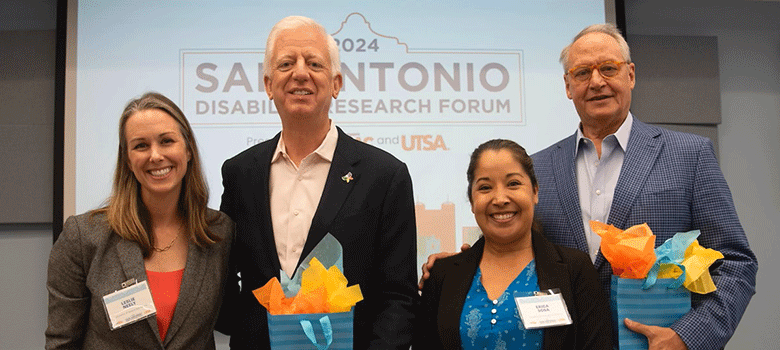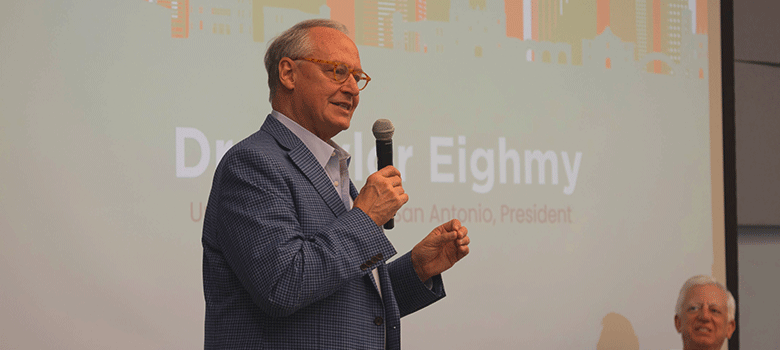
From left to right: Leslie Neely, associate professor in the UTSA Department of Educational Psychology; Jasmine Rodriguez, outreach director for Rep. Joaquin Castro; Sandy Ethridge, president of Morgan's MAC; and Erica Sosa, professor in the UTSA Department of Public Health.
JUNE 11, 2024 — UTSA and Morgan’s Multi-Assistance Center (MAC) recently co-hosted the 2024 San Antonio Disability Research Forum. Among the attendees were UTSA President Taylor Eighmy and Gordon Hartman, founder of the Gordon Hartman Family Foundation and Morgan's MAC.
The forum was an opportunity to showcase impactful disability-focused research headed up by Leslie Neely, associate director of the UTSA Brain Health Consortium and associate professor in the UTSA Department of Educational Psychology, and Erica Sosa, associate dean for research success and professor in the UTSA Department of Public Health.
In 2022, Neely and Sosa, in collaboration with Morgan's MAC, established the Evaluation and Research Coordinating Center (ERCC) to serve as a central hub for facilitating their work to improve patient outcomes for people with special needs and disabilities and their caregivers. The colorful, three-story, 165,000-square-foot Morgan's MAC houses more than 30 community-based organizations and providers, working together to address the multi-faceted needs of individuals with cognitive and physical special needs.
In February of 2023, Congressman Joaquin Castro announced nearly $500,000 in federal investment for the ERCC — money that was instrumental in catalyzing the partnership between UTSA and MAC and their work caring for individuals with special needs. The funding was part of a $15.6 million package for 15 community projects in San Antonio.
With the funding from Congressman Castro, Neely and Sosa developed a comprehensive research and evaluation plan for disability research, seeding four pilot studies. They, along with the seed grant teams, presented their results at the research forum, with the final goal of disseminating the findings to a larger audience for continued funding after the grant ends in July.

UTSA and Morgan’s Multi-Assistance Center (MAC) at Morgan’s Wonderland recently co-hosted the 2024 San Antonio Disability Research Forum. From left to right: Leslie Neely, associate director of the UTSA Brain Health Consortium and associate professor in the UTSA Department of Educational Psychology; Gordon Hartman, founder of the Hartman Foundation and MAC; Erica Sosa, associate dean for research success and professor in the UTSA Department of Public Health; and Taylor Eighmy, president of UTSA.
One pilot study explored a method of rehabilitation that incorporates immersive virtual reality (VR) through a head-mounted display. The team consisted of UTSA professors John Quarles, Kevin Desai and Ayda Eghbalian from the UTSA Department of Computer Science; Alberto Cordova from the UTSA Department of Kinesiology; and Madison Rivenburg and Barbra Goldman from locally based TeamAbility. After collecting motion data and VR accessibility feedback from patients who have a variety of disabilities, the research team developed personalized, deep learning models with the aim of predicting rehabilitation performance of an individual in real time.
Evaluating inclusion of individuals in the ambassador program at Morgan’s MAC was the focus of the second study presented at the forum. Felicia Castro-Villarreal and Katie Holloway from the UTSA Department of Educational Psychology and Sara Patton and ME Cormier from the Morgan’s MAC Ambassador Program are leading the project. Ambassadors are adults with disabilities who volunteer at Morgan's MAC to foster a welcoming culture for the larger community. Using surveys and interviews, the researchers evaluated how the program has impacted the Ambassadors themselves, including the efficacy of providing these individuals with job-readiness skills.
The third team, which includes Jaimie Jacobs from TEAMability and Sakiko Oyama and Se-Woong Park from the UTSA Department of Kinesiology looked to address how clinicians and therapists can use technology to capture improvements and comprehensive data of progress in rehabilitation of patients with disabilities. The team of researchers are processing data to understand how technology can quantify the progress in postural stability and walking patterns.
In the final study presented at the research forum, Dr. Robert Sanders from CommuniCare; and Adel Alaeddini, Julian Carvajal and Melissa Galeano from the UTSA Department of Mechanical Engineering discussed their work identifying the need for a patient’s interdisciplinary team to have access to medical reports written in simple, non-technical language. The goal of this study is to leverage language models like OpenAI’s GPT-4 to automate the summarization and visualization of medical reports.
“As a goal of our research, we always aim to provide expert consultation and clinical services to participants and have co-treated patients together since the MAC opened in 2022,” Neely explained.

UTSA President Taylor Eighmy spoke at the 2024 San Antonio Disability Research Forum on Friday, June 7.
The forum also featured presentations that showcased the power of community-based participatory research (CBPR), which emphasizes the use of community voices to inform research that translates into practical, real-world applications.
“One of the presentations invited the research participants, adults with disabilities, to share what their experience was like participating in the research,” Neely said. “It was a powerful testimony where the participants shared how valuable it was to be listened to.”
Located within walking distance of world-renowned Morgan’s Wonderland theme park, Morgan's MAC is a center that improves the lives of individuals with disabilities and special needs through comprehensive and coordinated navigation services. The MAC Care Model focuses on finding solutions to problems through specially educated team members known as MAC Navigators that serve as guides, or single points of contact, for individuals assisted by the center. Navigators not only guide these individuals, or MAC Members, to service providers at Morgan's MAC and in the community but also track progress and schedule follow-ups via the MAC Navigation System electronic platform. UTSA’s ERCC will oversee the vital function of measuring and reporting progress with the goal of making improvements to benefit MAC Members.
UTSA Today is produced by University Communications and Marketing, the official news source of The University of Texas at San Antonio. Send your feedback to news@utsa.edu. Keep up-to-date on UTSA news by visiting UTSA Today. Connect with UTSA online at Facebook, Twitter, Youtube and Instagram.
Move In To COLFA is strongly recommended for new students in COLFA. It gives you the chance to learn about the Student Success Center, campus resources and meet new friends!
Academic Classroom: Lecture Hall (MH 2.01.10,) McKinney Humanities BldgWe invite you to join us for Birds Up! Downtown, an exciting welcome back event designed to connect students with the different departments at the Downtown Campus. Students will have the opportunity to learn about some of the departments on campus, gain access to different resources, and collect some giveaways!
Bill Miller PlazaJoin us for an intimate evening of cocktails, conversation, and culinary inspiration with Pati Jinich, Emmy-nominated chef and James Beard Award-winning author. Enjoy light bites and signature drinks in the warm, modern setting of Mezquite as Pati connects with guests over her passion for Mexican cuisine and storytelling.
Mezquite Restaurant in Pullman Market, 221 Newell Ave., San Antonio 78215From inspired courses to thoughtful pairings and a rich sense of community, the Ven a Comer Signature Dinner is a night of shared meals, shared stories, and unforgettable flavor.
Stable Hall (Pear Brewery), 307 Pearl Pkwy, San Antonio 78215Come and celebrate this year's homecoming at the Downtown Campus with food, games, giveaways, music, and more. We look forward to seeing your Roadrunner Spirit!
Bill Miller PlazaThe University of Texas at San Antonio is dedicated to the advancement of knowledge through research and discovery, teaching and learning, community engagement and public service. As an institution of access and excellence, UTSA embraces multicultural traditions and serves as a center for intellectual and creative resources as well as a catalyst for socioeconomic development and the commercialization of intellectual property - for Texas, the nation and the world.
To be a premier public research university, providing access to educational excellence and preparing citizen leaders for the global environment.
We encourage an environment of dialogue and discovery, where integrity, excellence, respect, collaboration and innovation are fostered.